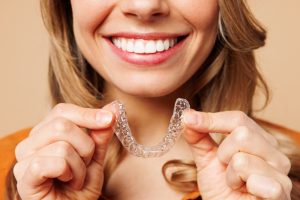Tooth enamel is the thin outer shell of the tooth, and the hardest tissue in the human body. Enamel is not, however, invincible. Your teeth are constantly exposed to harmful substances like sugar and acids from food that can damage and decay your enamel, and it is important to be on the lookout for possible enamel erosion. Our general dentistry experts at Parkcrest Dental Group want to talk enamel loss: what it is, and how to prevent it. Read on below to learn all about tooth enamel erosion.
What is Enamel Erosion?
When enamel is exposed to harmful chemical acid processes or friction, it slowly wears down over time. Unlike a broken bone, the human body cannot repair enamel as it contains no living cells. Thus, when enamel is lost it is permanent. One of the main focuses of general dentistry is maintaining and protecting our enamel from this damage.
What Causes Enamel Erosion?
As mentioned above, exposure to the chemical acid process is the main cause of enamel erosion. This generally occurs from consuming sugar or acidic food and drink. Things like sodas, fruit drinks, and carbonation lower the pH level in the mouth, making saliva work against the enamel of the tooth. Gastric acid, resulting from medical or psychological conditions (acid reflux, anorexia, alcoholism, etc) can also impact enamel erosion.
Environmental effects also can impact the health of tooth enamel. The tooth-to-tooth friction that happens when you clench or grind your teeth(bruxism) often occurs involuntarily during sleep. Chewing or biting on hard objects (like fingernails, ice, bottle caps) also can cause damage over time to your enamel. Lastly, physical damage from cracks or chipping exposes the inner tooth to damage by destroying the outer enamel.
Related Post: General Dentistry Tips: Worst Drinks For Teeth
Signs of Enamel Damage
There are some things you can look for before receiving general dentistry advice to see if you have enamel damage:
- Discolored teeth are a sign that enamel has worn away and the interior dentin of the tooth is exposed.
- The edges of the front of the teeth may appear transparent
- Certain foods, such as sweets, or temperatures of foods causing tooth pain is an early sign of enamel erosion.
- Severe sensitivity generally means you are in the later stages of enamel erosion and in immediate need of general dentistry before enamel is lost.
How to Prevent Enamel Erosion
There are quite a few habits recommended by general dentistry experts to reduce or prevent erosion that you can begin:
- Reduce consumption of acidic or sugary foods. If you do consume acidic foods make sure to rinse your mouth with water immediately after.
- Use a straw to bypass your teeth when consuming acidic drinks.
- Increase time between snacks and meals. The mouth generally stays acidic for a few hours after consuming foods that are high in sugars and starches.
- Drink more water to avoid dry-mouth, as saliva helps to strengthen teeth with important minerals.
- Use products such as toothpaste and rinses that contain fluoride. Fluoride creates a barrier between acidic products and your enamel, helping to prevent the erosion from occurring.
- Schedule regular dental appointments with, at least every six months to check on erosion and receive general dentistry procedures designed to protect your tooth enamel.
Related Post: Parkcrest Dental Group: Tips For Sensitive Teeth
For More Information
Contact Parkcrest Dental Group for any questions regarding enamel erosion or any general dentistry related inquiries. If you are interested in scheduling an appointment, call today at 417.887.1220 to speak with our helpful staff!




